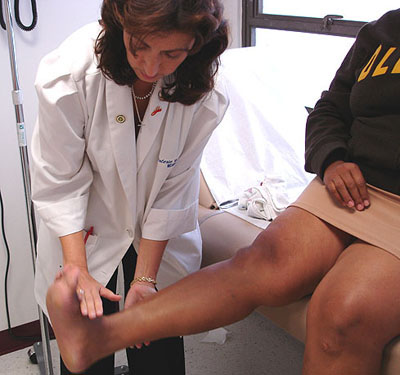Valerie Wojna: Finding Healthcare Alternatives for HIV-Positive Women
Submitted by Mónica Ivelisse Feliú-Mójer on
Great advances in the management, prevention and treatment of the human immunodeficiency virus (HIV) and acquired immune deficiency syndrome (AIDS) have significantly reduced the mortality caused by this infection. However, the stigma around the disease remains, so there are groups of patients who are discriminated against when receiving medical care. Dr. Valerie Wojna, professor at the Medical Sciences Campus of the University of Puerto Rico (MSC-UPR), seeks to improve the quality of life of one of these underserved groups: women with HIV.
Raised in Caguas, Puerto Rico, Dr. Wojna studies the effects of HIV/AIDS on the brain and nervous system, through the Specialized Program of Neuroscience and NeuroAIDS at MSC-UPR. Besides affecting the immune system, HIV can cause dementia, memory problems, neuropathies and increase the likelihood of infections of the nervous system, among other neurological complications.
This medical doctor, a product of the University of Puerto Rico (UPR) and specialist in neurology and clinical neurophysiology, became interested in working with neglected populations during her early years as faculty at the UPR School of Medicine. "My main responsibility was to offer services to medically indigent patients," she says.

Dr. Wojna sees one of her patients.
As she treated her patients in outpatient clinics and the hospital, Dr. Wojna says "I always had that spark in me to do clinical research. However, at that time clinical research was not our forte and the road was very hard." But she was not daunted by this. In 1999 the National Institutes of Health (NIH) made a request for proposals for the "Specialized Neuroscience Research Program (SNRP)" a mechanism to create research centers in minority institutions, with the mentorship of established researchers. The request was for a clinical study of the neurological complications of HIV.
"My supervisors knew my interest in clinical research and invited me to participate. The truth is that at the time I knew almost nothing about the complications of HIV, because I had concentrated on issues of epilepsy and clinical neurophysiology. However I understood that it was a unique opportunity and I accepted," she recalls.
"I decided to study a special population, HIV-infected women and combined this with a subject that fascinated me, behavior and memory problems. Combining the research of HIV/AIDS with my other interests to study neurocognitive complications in women with HIV allows me to find alternative care to improve the quality of life my patients and make a big difference in the treatment of their conditions," she adds.
Dr. Valerie Wojna and her colleagues have led several research projects to understand how HIV affects the brain of infected women. One study measured hormone levels in HIV-positive women and investigated how these are associated with memory problems. Dr. Wojna and her colleagues also designed and established the first battery of neuropsychological tests in Spanish for HIV-positive Hispanic women. This battery of tests is adapted not only to the language but to the Hispanic culture, and can help assess the neurocognitive symptoms of these women more effectively and therefore offer better treatment options.
Currently, one of their greatest efforts focuses on identifying a biomarker for neurocognitive dysfunction in HIV: the soluble insulin receptor. This receptor is involved in sugar metabolism in the brain and plays an important role in the growth and survival of neurons. In addition, the soluble insulin receptor plays a role in synaptic plasticity, the main mechanism behind learning and memory. In collaboration with Dr. Yamil Gerena, assistant professor RCM-UPR, Dr. Valerie Wojna and his team have found that this biomarker is elevated in women with HIV. Currently they are looking to understand how it is produced and how it could be used to diagnose neurocognitive dysfunction in HIV-positive women. Recently Dr. Wojna and Dr. Gerena received $1.9 million for 5 years from the NIH (R01) to move their projects forward.
Mentoring: Key to Success
Without hesitation Dr. Wojna says that the key to "my success in translational and clinical research is largely due to my mentors." Therefore she feels that one of her greatest responsibilities as a leader in her field is to mentor students and young faculty. In particular, Dr. Valerie Wojna strives to mentor female scientists, "because women today still have to overcome many obstacles".

Besides research, Dr. Wojna loves dancing.
"When I trained there were few women in the field of medicine. In fact women were discriminated against in the two fields I chose: mathematics (in which she completed her undergraduate degree) and medicine. But when you are determined, these negative experiences can be a source of strength. I have been privileged to have excellent mentors, both male and female", she says with conviction. Dr. Wojna adds that these people have taught her how to do clinical and translational research and strategies to overcome the obstacles facing women in the sciences.
To her students and anyone interested in pursuing a career in science she recommends perseverance and staying open to opportunities that arise. "Many times we get frustrated because things do not happen as planned and this discourages us," she says. For example, at the beginning of her career Dr. Wojna did not intend to study the neurological effects of HIV but when the opportunity arose, she took the plunge.
"The truth is that many times we have to be creative to see how the opportunities in front can enrich us and how we can use them to dig deeper into our original ideas," she concludes.








